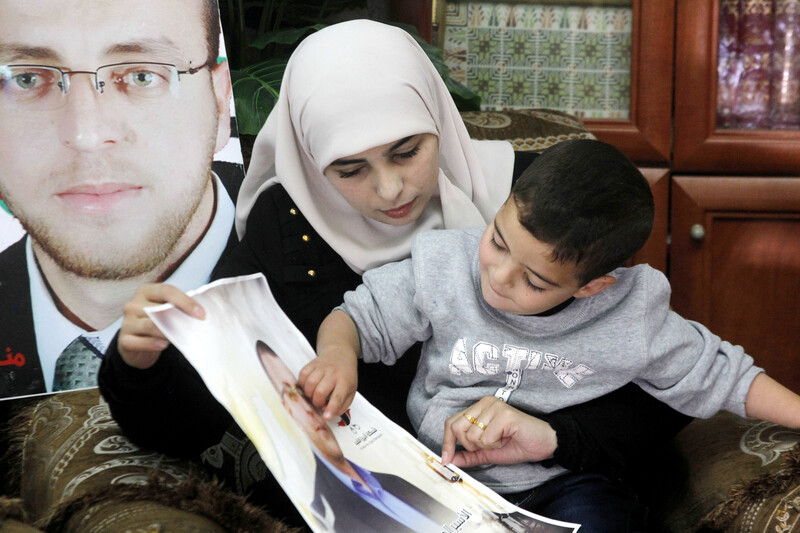Hunger striker Muhammad al-Qiq in “struggle against death”
Ali Abunimah

Fayha Shalash, the wife of gravely ill hunger-striking Palestinian journalist Muhammed al-Qiq, sits with her son at her home in the West Bank village of Dura on 20 January. Al Qiq, seen in the poster, started a hunger strike against his arbitrary detention by Israel in November.
APA images
Israeli doctors say that Palestinian hunger-striker Muhammad al-Qiq could die at any minute.
The 33-year-old journalist remained on hunger strike in the HaEmek hospital in Afula, in the north of present-day Israel, for the 75th consecutive day on Saturday.
Hiba Masalha, an attorney for the Palestinian Authority’s Commission for Detainees and Ex-Detainees Affairs, visited al-Qiq on Friday evening in the hospital where he is being kept under an Israeli court order.
Masalha said that al-Qiq is in a “struggle against death”
A photo tweeted by the Quds news outlet on Saturday shows al-Qiq with a Quran by his hospital bedside:
“He has completely lost the ability to speak. He continues to suffer from fatigue, dizziness and breathing difficulties due to the continuation of his hunger strike and his refusal of treatment for the 74th consecutive day,” she said.
Masalha added that al-Qiq’s condition has become severe following his rejection of the Israeli high court’s decision to “freeze” his administrative detention order.
On Thursday, the Israeli judges “froze” al-Qiq’s detention – but ordered him to remain in HaEmek hospital.
Al-Qiq began his hunger strike in November, shortly after Israeli authorities arrested him. Following his interrogation, Israel put him in administrative detention – indefinite imprisonment without charge or trial.
“The court’s decision is deception,” Masalha said, adding that al-Qiq’s demand “is an end to his detention, not a freezing which means that he can be re-arrested at any time.”
Masalha said that the deputy director of HaEmek hospital, Dr. Tuvia Tiyosuno, had informed her that al-Qiq is in extreme danger and in constant decline.
Al-Qiq’s internal organs could fail at any time and he is at high risk of bleeding in his brain.
His heart could stop beating at any time, which is why the hospital’s ethics committee decided that al-Qiq could be treated against his will if it meant saving his life, Masalha said the Israeli doctor told her.
“Every minute that passes poses a threat to his life,” Masalha cited Tiyosuno saying.
Masalha said she was called to the hospital by the Israeli doctors Friday evening in light of al-Qiq’s condition and his insistence that any treatment he received would take place only in a Palestinian hospital.
Masalha added that efforts were ongoing with Israel’s military occupation authorities to reach an agreement over al-Qiq’s case.
On Friday, Palestinian media disseminated this video of al-Qiq in his hospital bed holding a sign in English, Hebrew and Arabic declaring that he was continuing his hunger strike:
Earlier on Saturday, Quds TV reported that al-Qiq’s family had denied that any deal had been reached.
Human rights organizations and UN officials have called on Israel to charge or release al-Qiq, who is one of more than 660 Palestinians held in administrative detention.
As his strike has continued, Palestinians throughout the occupied West Bank, Gaza Strip and present-day Israel have held rallies and vigils in solidarity with al-Qiq.
On Friday, among his visitors in hospital was Sheikh Raed Salah, leader of the Northern Branch of the Islamic Movement in Israel, a political party Israel outlawed in November.
Update
On Sunday, al-Qiq refused an Israeli offer to be released in May. While still gravely ill and at risk of death, the hunger striker is insisting on an immediate end to his administrative detention, the Ma’an News Agencyreported.

0 Comments:
Post a Comment
Subscribe to Post Comments [Atom]
<< Home